Supported Species Fish

| Species Name: | Chinese Sturgeon |
| Scientific Name: | Acipenser sinensis |
| Conservation Status (Year Published): |
Critically Endangered (2010) Endangered (1996) The IUCN Red List of Threatened Species 2010: e.T236A13044272. Downloaded on 26 April 2017. |
| Estimated Wild Population: | Spawning population reduced to 203-257. Captive juveniles are released to supplement the wild stock. Population trend is decreasing. |
| Distribution: | Middle and lower reaches of the Yangtze river and close to shore in the Yellow and East China Sea. |
| Major Threats: | Historical overfishing and damming of rivers preventing them to reach the spawning grounds. |
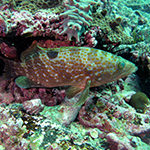
| Species Name: | Hong Kong Grouper |
| Scientific Name: | Epinephelus akaara |
| Conservation Status (Year Published): |
Endangered (2003) [Needs updating] The IUCN Red List of Threatened Species 2003: e.T43974A10846282. Downloaded on 26 April 2017. |
| Estimated Wild Population: | No clear information showing the current status, however the capture volume of wild fish declined from 50 to 90% throughout its geographical range in last few decades. |
| Distribution: | A limited distribution that coincides with the heavily fished inshore areas of Japan, Taiwan, Republic of Korea and southern China. |
| Major Threats: | Overfishing and habitat destruction |
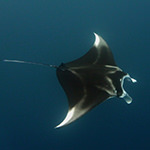
| Species Name: | Manta Rays |
| Scientific Name: | Manta birostris Manta alfredi |
| Conservation Status (Year Published): |
Vulnerable (2011) The IUCN Red List of Threatened Species 2011: e.T198921A9108067. Downloaded on 26 April 2017. The IUCN Red List of Threatened Species 2011: e.T195459A8969079. Downloaded on 26 April 2017. |
| Estimated Wild Population: | Uncertain. Population trend is decreasing. |
| Distribution: | Global tropical and temperate waters |
| Major Threats: | Overfishing and by-catch |
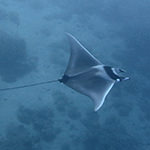
| Species Name: | Mobulas |
| Scientific Name: | Mobula tarapacana Mobula thurstoni Mobula japanica |
| Conservation Status (Year Published): |
Mobula tarapacana Vulnerable (2016); Data Deficient (2006) Mobula thurstoni Near Threatened (2006 & 2016) Mobula japanica Near Threatened (2006) The IUCN Red List of Threatened Species. Version 2016-3. <www.iucnredlist.org>. Downloaded on 26 April 2017. |
| Estimated Wild Population: | Unknown. Population trend for M. tarapacana & M. thurstoni is decreasing, and unknown for M. japonica. |
| Distribution: | Global tropical and temperate waters |
| Major Threats: | Overfishing and by-catch |
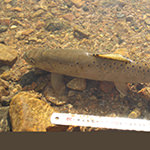
| Species Name: | Qinling Lenok |
| Scientific Name: | Brachymystax lenok spp. tsinlingensis |
| Conservation Status (Year Published): |
Second Class of National Key Protected Animal in China; Vulnerable in China Red Data Book of Endangered Species; Not Evaluated in IUCN Red List of Threatened Species |
| Estimated Wild Population: | Around 50,000 |
| Distribution: | Endemic to mountain streams of Qinling Mountains in China |
| Major Threats: | Overfishing, habitat loss due to dam construction and mining |

| Species Name: | Sichuan Taimen |
| Scientific Name: | Hucho bleekeri |
| Conservation Status (Year Published): |
Critically Endangered (2012) The IUCN Red List of Threatened Species 2012: e.T13151680A13151682. Downloaded on 26 April 2017. |
| Estimated Wild Population: | Estimated with 2,000-2,500 mature individuals. Population trend is decreasing. |
| Distribution: | Endemic to China, confines to the headwaters of the Yangtze River in Sichuan, Shaanxi and Qinghai Provinces. |
| Major Threats: | Habitat loss from hydropower station construction and soil erosion; over-exploitation from illegal fishing. |
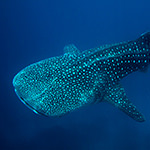
| Species Name: | Whale Shark |
| Scientific Name: | Rhincodon typus |
| Conservation Status (Year Published): |
Endangered (2016) |
| Estimated Wild Population: | Uncertain. Population trend is decreasing. |
| Distribution: | Tropical and warm temperate seas except the Mediterranean |
| Major Threats: | Directed fisheries and bycatch fisheries; intrinsic factors like slow growth and slow mature rate. |